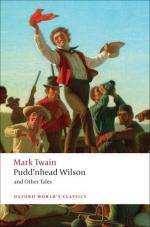pathetic little nickel-plated aristocratic instincts,
and detested his name, which was Dunlap; detested
it, partly because it was nearly as common in that
region as Smith, but mainly because it had a plebeian
sound to his ear. So he tried to ennoble it by
writing it in this way: d’Unlap. That
contented his eye, but left his ear unsatisfied, for
people gave the new name the same old pronunciation—emphasis
on the front end of it. He then did the bravest
thing that can be imagined—a thing to make
one shiver when one remembers how the world is given
to resenting shams and affectations; he began to write
his name so: d’Un Lap. And he waited
patiently through the long storm of mud that was flung
at this work of art, and he had his reward at last;
for he lived to see that name accepted, and the emphasis
put where he wanted it, by people who had known him
all his life, and to whom the tribe of Dunlaps had
been as familiar as the rain and the sunshine for
forty years. So sure of victory at last is the
courage that can wait. He said he had found,
by consulting some ancient French chronicles, that
the name was rightly and originally written d’Un
Lap; and said that if it were translated into English
it would mean Peterson: Lap, Latin or Greek, he
said, for stone or rock, same as the French Pierre,
that is to say, Peter; d’, of or from; un, a
or one; hence d’Un Lap, of or from a stone or
a Peter; that is to say, one who is the son of a stone,
the son of a Peter—Peterson. Our militia
company were not learned, and the explanation confused
them; so they called him Peterson Dunlap. He
proved useful to us in his way; he named our camps
for us, and he generally struck a name that was ’no
slouch,’ as the boys said.
That is one sample of us. Another was Ed Stevens,
son of the town jeweller,—trim-built, handsome,
graceful, neat as a cat; bright, educated, but given
over entirely to fun. There was nothing serious
in life to him. As far as he was concerned,
this military expedition of ours was simply a holiday.
I should say that about half of us looked upon it
in the same way; not consciously, perhaps, but unconsciously.
We did not think; we were not capable of it.
As for myself, I was full of unreasoning joy to be
done with turning out of bed at midnight and four
in the morning, for a while; grateful to have a change,
new scenes, new occupations, a new interest.
In my thoughts that was as far as I went; I did not
go into the details; as a rule one doesn’t at
twenty-five.
Another sample was Smith, the blacksmith’s apprentice.
This vast donkey had some pluck, of a slow and sluggish
nature, but a soft heart; at one time he would knock
a horse down for some impropriety, and at another he
would get homesick and cry. However, he had one
ultimate credit to his account which some of us hadn’t:
he stuck to the war, and was killed in battle at last.
Jo Bowers, another sample, was a huge, good-natured,
flax-headed lubber; lazy, sentimental, full of harmless
brag, a grumbler by nature; an experienced, industrious,
ambitious, and often quite picturesque liar, and yet
not a successful one, for he had had no intelligent
training, but was allowed to come up just any way.
This life was serious enough to him, and seldom satisfactory.
But he was a good fellow, anyway, and the boys all
liked him. He was made orderly sergeant; Stevens
was made corporal.




